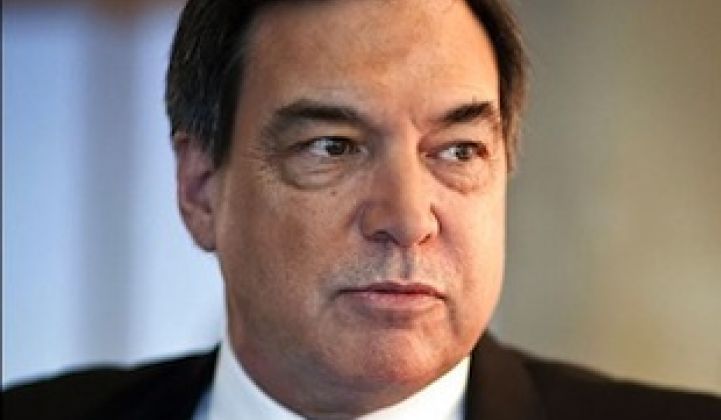Jon Wellinghoff, chairman of the Federal Energy Regulatory Commission, is resigning his post after a four-year tenure marked by aggressive energy market enforcement and some formative support for renewable energy, demand response and smart grid technologies.
Wellinghoff informed President Obama of his resignation Tuesday, and will remain as acting chairman until a replacement is nominated and confirmed by the Senate, according to news reports. Politico reported Wednesday that potential nominees include Arkansas Public Service Commission Chairwoman Colette Honorable and current FERC Commissioner John Norris, the next most senior Democrat on the commission.
Reasons for his departure weren’t reported, but Wellinghoff, a former Nevada utility regulator who joined the FERC commission in 2006 and was named its chairman in 2009, did tell an audience at last week’s Electricity Storage Association conference in Santa Clara., Calif. that his job was, to describe it in one word, "impossible."
"I oversee the biggest machine in the world,” he said, referring to the nationwide power grid, over which FERC has incomplete jurisdiction -- it regulates the interstate transmission of electricity, natural gas and oil, but has limited authority over what utilities and grid operators do within state boundaries.
At the same time, Wellinghoff was a champion of FERC decisions that helped boost the market power and viability of technologies like demand response. FERC Order 745, put into effect in 2011, has helped boost demand response revenues by requiring that grid operators like PJM pay them prices more closely matched to the wholesale market prices that generators make, for example, while FERC Order 755 has allowed fast-acting DR and energy storage assets to balance grid frequency alongside natural gas turbines and other generation resources.
During his time as the head of FERC, Wellinghoff also led investigations into market manipulation and fraud allegations against such big energy traders as Deutsche Bank, Barclays and JPMorgan Chase. Last year, the agency negotiated a $245 million settlement package from Constellation Energy related to violations of rules relating to market manipulation and information accuracy.



